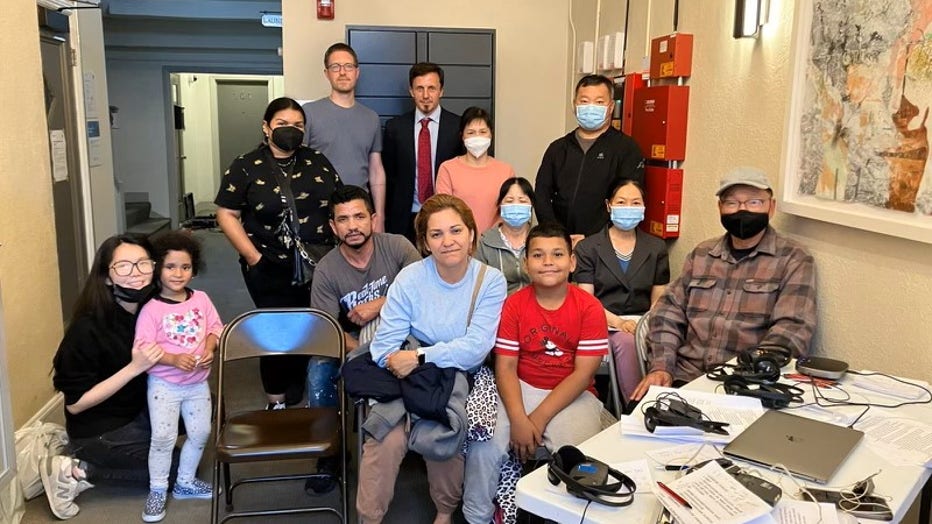More SF tenants engage in 'rent strike,' to leverage demands from landlords
Veritas Tenants Association members at 434 Leavenworth Street in San Francisco have gone on a rent strike. (Housing Rights Committee of San Francisco)
SAN FRANCISCO - Tenants in some 75 rental units in San Francisco have been on rent strikes, withholding their monthly payments until their demands from their landlords have been met. It’s a tactic costing landlords hundreds of thousands of dollars and one that could become increasingly common in the Bay Area and around the country as unionized renters seek ways to flex their bargaining muscle.
Earlier this month, a group of residents at 516 Ellis Street became the latest in the city to join a so-called "rolling strike," by the Veritas Tenants Association (VTA), a statewide tenant union for renters living in multi-unit buildings operated by real estate management firm Veritas Investments.
San Francisco VTA members first launched the strike back in June at two Veritas buildings: 709 Geary Street and 320-324 14th Street. Similar action followed at 781 O'Farrell Street on Sept. 1, with members at 434 Leavenworth Street joining one month later.
SEE ALSO: Renting a home in US is still more affordable than owning, new report shows
The issues at the different properties vary from language access protocols, to "pass through" rent increases, as well as allegations of structural problems and complaints of broken mailboxes. There have also been Notices of Violation issued by the Department of Building Inspection (DBI) regarding issues of rats and cockroaches and mold.

A tenant at 434 Leavenworth Street in San Francisco complained of mold. (Housing Rights Committee of San Francisco)
At two of the properties, tenant advocates said that Veritas refused to recognize the tenant association for about a year.
A Veritas spokesman said one of those properties, 781 O'Farrell Street, the tenants did not initially meet the requirement that at least 50% of the tenants in the building submit petitions to form an association in 2022, and when it did so later, Veritas did meet with the association.
The other building, 516 Ellis Street, the company refuted the fact that an association has even been formed, saying, "There has not been enough residents who have expressed the desire to form one."
In regard to the maintenance and health and safety allegations, Veritas noted that complaints were frequently submitted to DBI without properly going through the request channels, using the company’s GreenTree’s service.
"Veritas and its GreenTree services group has one of, if not the largest maintenance teams in the city, and responds to all maintenance issues that residents report to us," a Veritas spokesman told KTVU, adding, "The vast majority of service issues are handled within days. Some can take longer, depending on the circumstances, during which time we communicate the issues and actions to residents and work to minimize the inconvenience."
Negotiations between the tenants’ union and the landlord have been made complicated by the fact that last year, Veritas defaulted on loans, selling parts of its portfolio, which left tenants dealing with new property owners over unresolved issues, according to tenants’ rights advocates.
SEE ALSO: Affordable housing lottery: 3-bedroom Bay Area home for $183,000
The non-profit Housing Rights Committee of San Francisco (HRCSF) has been working with VTA and other tenant associations.
Spokesman Brad Hirn said in the last year, many frustrated members have been emboldened by widespread news coverage of labor strikes in various industries, from auto manufacturing to entertainment, so it’s become an appealing option for renters to use the strike model as a bargaining tool.
"For tenants the threat of withholding rent can be a very powerful threat," he said.
But Hirn said the action was not one they advised members to adopt, unless all other avenues have been thoroughly exhausted, because the risk was a high price to pay: possible eviction.
"They vote on doing it after usually many attempts to get an owner to make a decent proposal on something," Hirn said. "We describe it as a last resort and the most powerful."
He said that from the perspective of negotiation power, even the threat of a strike could help tenants when faced with battling it out with big corporation landlords.
"It’s a collective action, strength in numbers. Are you, by yourself, going to be in a strong enough negotiating position to get these issues arrested?" It’s even more difficult, Hirn noted, when tenants face a language barrier and struggle with reading, writing, and speaking English.
He also said that striking tenants were strongly advised to follow a specific plan to put the money that was being withheld in an escrow account managed by a licensed attorney.
The objective was not for tenants to simply pocket their rent money.
"We would advise against that," Hirn said. "The goal is that during the course of negotiation, what they eventually pay to the owner, is less than what they originally owed," he explained.
At one of the buildings that went on strike in June, Hirn said, they only opted to take that route after trying to get Veritas to the table for an entire year.
Ultimately, it took a strike for the company to come to agree to meet, negotiate and finally reach an agreement on the tenants’ demands over health and safety complaints, according to Hirn.
He said it resulted in a total of about $100,000 in lowered rents for tenants, as well as the landlord rescinding a rent increase for the last 12 months.
"So that’s really what we’re talking about, substantial amounts of money that tenants can keep in their pocket for other things in their lives, and getting big companies to comply with the law," Hirn explained.
He also said the collective action has led to eviction attempts being halted.
Rent strikes have become more a part of the discussion when exploring negotiation tactics, because of a first-of-its kind ordinance passed in San Francisco in 2022.
The Tenant-At-Home ordinance gives tenants enhanced rights to organize within their buildings, and it requires landlords to bargain with a tenant association in good faith, similar to an employer being required to meet with unionized workers.
"The ordinance is a really good example of a law that helps encourage organizing," Hirn said, adding, "It encourages tenants to think about, who are my neighbors and how do we come about talking about [the issues]? It has helped expand the number of people who are organizing that may not have otherwise gotten involved."
The San Francisco Apartment Association (SFAA), which represents property owners with members ranging from small mom-and-pop landlords to large real estate management companies including Veritas, said there haven’t been a lot of tenant associations being formed in the city. The group charged the ones that have been organized recently were part of a strong push by a single non-profit, the HRCSF.
The tenant advocate group said unions were growing, pointing to data that showed in the first year of San Francisco's landmark ordinance, at least 50 buildings formed tenant associations and that the associations included more than 1,000 units of rental housing. And unions were formed in buildings with a range of landlords, from large investment firms to small property owners.
One thing that both groups agreed on was that rent strikes should not be a go-to option.
"It’s a risky proposition to not pay rent," said Charley Goss with the SFAA. "On a certain level, it puts the people’s tenancies at risk, which we don't see as a good thing, and it also puts our members in a financial pickle. Their mortgage payments and their property taxes keep coming."
Goss also noted that with the rental market in San Francisco in a turbulent state since the city saw a notable exodus with the pandemic, it added to the financial stress facing property owners, preventing them from not only making their own payments but keeping up with the building maintenance.
Goss said SFAA has worked to get property owners to be responsive to their tenants’ needs and foster communications between the parties, which he saw as a much more effective approach to resolving issues, as opposed to striking.
"We think that works better for everybody," he said.
Hirn said his organization has heard from tenants in other U.S. cities asking about the Tenant-At-Home ordinance. He said they want to know how to organize and how to launch a strong, safe and successful strike.
"I think part of it is desperation," he said, explaining that tenants consider the option to strike when they feel that they have no power and no other recourse, especially when facing big corporation property owners, and he noted, "I think it will expand to other cities in the Bay Area."

Members of the Veritas Tenants Association at 781 O'Farrell Street in San Francisco. (Housing Rights Committee of San Francisco)

